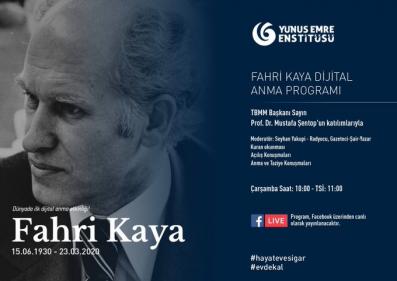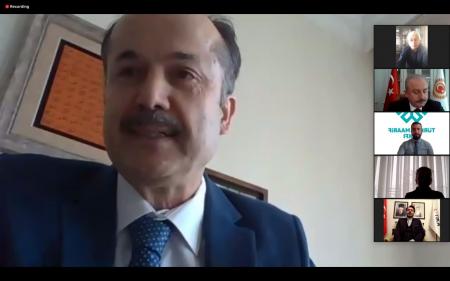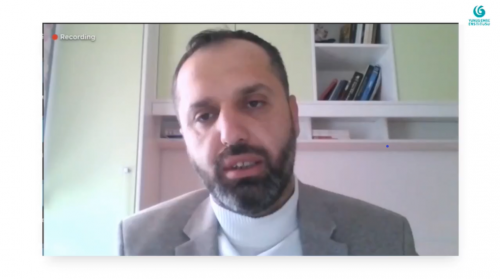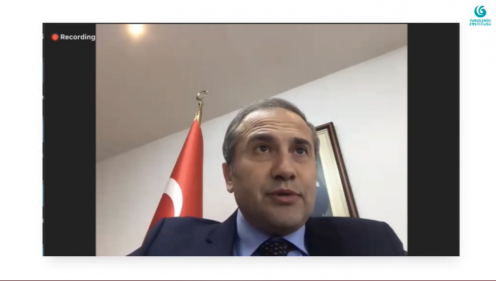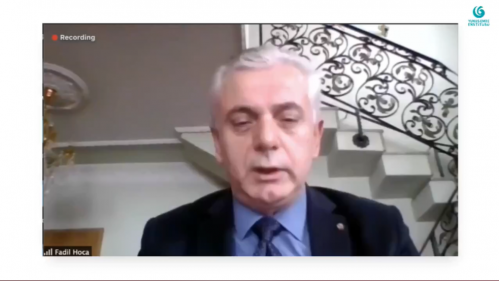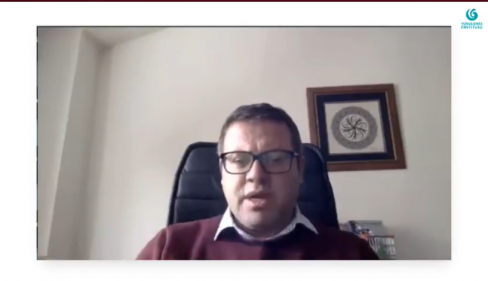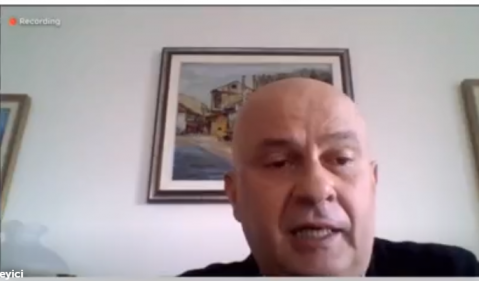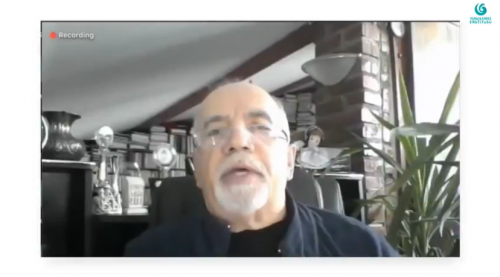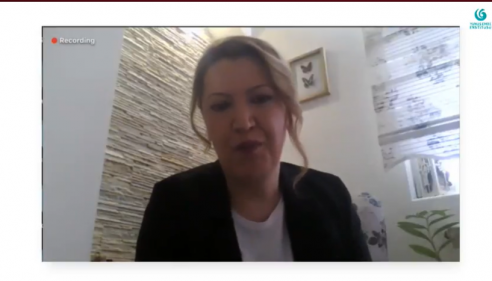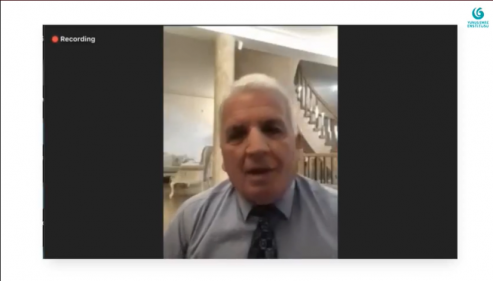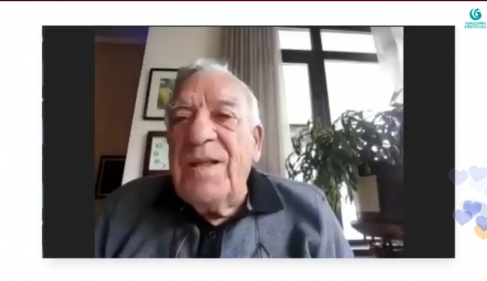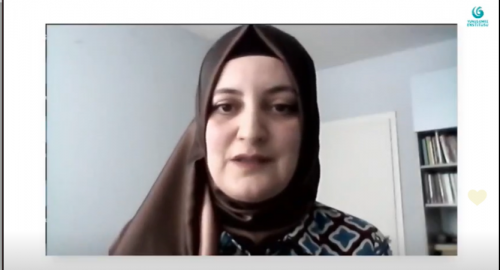Digital Commemoration Program for Fahri Kaya
Turkologist, poet and writer Fahri Kaya has been commemorated in a program organized via Yunus Emre Institute's branches in North Macedonia and Kosovo.
The commemoration program organized in the digital environment for Fahri Kaya, who wrote many books on the promotion of Turkish culture in the Balkans and died on March 23, 2020 at the age of 90, has been followed by thousands of people.
The program was attended by Speaker of the Grand National Assembly of Turkey Prof. Dr. Mustafa Şentop, Culture and Tourism Deputy Minister Dr. Serdar Çam and Yunus Emre Institute President Prof. Dr. Şeref Ateş as well as politicians, bureaucrats, diplomats, dignitaries and representatives of various institutions and organizations from Turkey, North Macedonia and Kosovo and Fahri Kaya's family.
In the program aired live from the social media accounts of Yunus Emre Institute on April 1, 2020, Parliament Speaker Şentop said: "I believe that we will overcome this predicament just as we coped with many difficulties with unity and solidarity in the past. In this context, my advice to our sisters and brothers in North Macedonia is that they should take proper measures and comply with the measures and principles introduced by the government."
Noting that Kaya, an educationalist and writer, had worked to foster Turkish language in Macedonia for many years, Şentop indicated that his death was a great loss for Turkish culture, Turkish language and Turkish identity in Macedonia. He underlined that Kaya's life and his efforts to promote Turkish and Turkish language should set an example for future generations.
Culture and Tourism Deputy Minister Serdar Çam stated that he was enthusiastic to attend the program. "It is really a significant achievement to bring so many spectators together on such a beneficial occasion at a time of considerable problems, hardships and sorrows around the world. In this context, these efforts have paved the way for certain novel gatherings in Turkey, the Balkans and around the world," he said.
Çam pointed out that although the funeral ceremony of Kaya didn't attract huge crowds due to the Covid-19, the present program served as a funeral prayer for him. "We all should try to inherit his legacy and pass it to future generations hopefully in the best way possible. With the light and help from him," he said.
Expressing his love, respect and affection for the Balkan peoples, Çam indicated their hearts were already very close to each other and now at the closeness of a screen.
Yunus Emre Institute President Prof. Dr. Şeref Ateş emphasized that it is important to organize such a program under the current conditions as it is proof of the resilience of Turkish nation. "In Turkish culture, it is one of the fundamental humanitarian duties to let people live and commemorate their memories after they die. In this context, we have come together via this medium in order to remember of the memory of late Fahri Kaya," he said.
Ateş drew attention to the fact that it is important to continue to promote Turkish culture, Turkish people and Turkish perspective on human beings. "The Balkan Turks are of crucial importance for Turkish identity, and this principle should govern our approach to the Balkan Turks. Indeed, to take lessons from history is not to recount the incidents and events one after another, but to comprehend the causes behind those events. For this reason, we as the Turkish nation lend support to all activities to be conducted in this geography on the common ground and for the benefit of entire humanity," he said.
During the program moderated by radio programmer, poet and writer Seyhan Yakupi, memories about the literary, political and personal identity of Kaya were shared.
Ambassador of the Republic of Turkey to Skopje Hasan Mehmet Sekizkök touched on the political identity of Kaya. "Fahri Kaya was an opinion leader who came out of Turks of North Macedonia. He fought to promote Turkish identity and national identity in these lands. He was the representative of Turkish identity in Rumelia and North Macedonia. He gave the Turkish community in North Macedonia the determination to stand against all hardships. He served as a glimmer of hope for those who were concerned about survival," he said.
Sekizkök noted that Kaya exerted great efforts to raise awareness for the Turkish identity in North Macedonia. "It is the duty of Turks who are determined to live in these lands to protect, promote and foster Turkish identity in North Macedonia," Sekizkök quoted Kaya as saying. "Availing myself of this opportunity, and in my capacity as the ambassador of the Republic of Turkey, I believe it a task for me to underline this responsibility which Kaya had reminded for Macedonian Turks," he said.
Union of Turkish NGOs in Republic of Macedonia (MATÜSİTEB) Chairman Hüsrev Emin stated that Fahri Kaya as a major landmark in Turkish literature. "We have lost one of our elders. His studies on literature and culture of North Macedonia and Balkan Turks have already taken its place in history. He was a touchstone in the survival of Turkish identity and he set an example," he said.
The program ended with the commemoration and condolence speeches by academics and writers from North Macedonia and Kosovo and Kaya's son Eren Kaya's speech thanking for the condolences.

